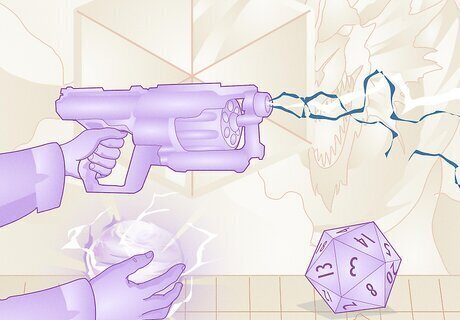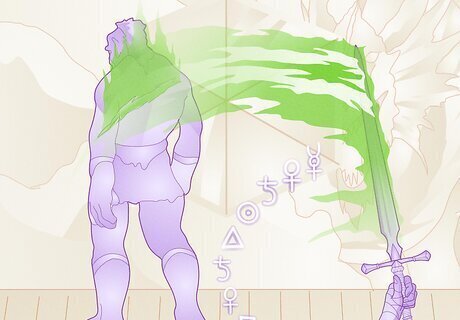
views
What is the War Caster feat?

War Caster is an optional feat that affects spellcasting in combat. In D&D 5e, you can periodically choose feats for your character upon leveling up, each granting additional abilities and skills depending on the specific feat. War Caster makes it easier for players to wield weapons and cast spells in battle simultaneously, as well as maintain concentration on spells. War Caster is one of many feats included in the 5th edition Player’s Handbook. The feat is often considered a staple for spellcasting PCs (player characters), especially those who also spend time on the front lines in combat.
War Caster Rules & Perks

You get advantage on Constitution saves to maintain concentration. Concentration spells require constant focus. If your PC takes damage while casting a concentration spell, they must make a Constitution saving throw to see if they can maintain the spell. With War Caster, you can make that save with advantage, rolling a d20 twice and taking the higher result. War Caster essentially makes all concentration-based Constitution saves more likely to succeed, making your PC a more effective spellcaster, even when under fire in combat.

You can perform somatic spells while holding a weapon or shield. Somatic spell components are simply the hand gestures required to cast certain spells. Normally, if your PC’s hands are full (with a weapon, for example), they wouldn’t be able to cast a somatic spell. However, with the War Caster feat, your PC can cast somatic spells even if they have a weapon or shield in one or both hands. For example, say your PC is a paladin holding a longsword in their main hand and a shield in their off-hand. Without War Caster, your paladin would have to spend time putting one (or both) items down before they could cast a spell with somatic components. With War Caster, you wouldn’t have to worry about your paladin’s equipment because they could fulfill somatic components while holding their weapons.

You can cast a spell as an attack of opportunity. When a hostile creature moves out of your reach, you can use a reaction to make an attack of opportunity against them. However, you can normally only use weapons for opportunity attacks—not spells. War Caster changes that, allowing you to cast any spell that takes 1 action and targets a single creature as an opportunity attack. For example, cantrips like Shocking Grasp, Booming Blade, or Green-Flame Blade normally require an action to cast, but you could cast them on an opportunity attack with War Caster. However, keep in mind that certain spells might not work if you have a reach weapon (meaning the weapon adds 5 feet to your overall reach for a total range of 10 feet). For example, since Booming Blade and Green-Flame Blade have a 5-foot range, they wouldn’t work on weapons with a 10-foot range.
Is War Caster a useful feat?

Yes, War Caster is extremely powerful and effective for many classes. Many classes have the ability to cast spells, and losing concentration on a spell can make casting it feel like a waste of your action or turn—so the advantage offered by War Caster can work wonders. Classes that normally cast spells instead of making weapon attacks may also do better with magical opportunity attacks. If you lose concentration on a spell, you might also have to recast it, which would cost an additional spell slot. If it helps you maintain concentration, War Caster also preserves more spell slots.
Which classes can benefit from War Caster?

Spellcasters who are often involved in melee combat can use this feat. Some spellcasters (like clerics, rangers, and certain subclasses like the College of Swords bard or Bladesinger wizard) have abilities that naturally put them closer to the front lines. Others might find themselves targeted by an enemy, even if they’re not frontline fighters. Classes that benefit from War Caster include: Artificers are proficient with shields, so they might be able to make use of War Caster by casting spells while holding a shield for the armor class bonus. Bards can make great use of the advantage on CON saves related to concentration and spell opportunity attacks, especially College of Swords and College of Valor bards. Clerics are often built to wade into the fray, and War Caster makes them even more potent. Just remember that clerics can display their spellcasting focus on their shield, making War Caster’s somatic spellcasting benefit redundant. A spellcasting focus allows PCs to cast spells without components (including somatic gestures). However, the boost in concentration and ability to use spells on opportunity attacks still makes this feat worthwhile for clerics. Druids normally cast spells from the backlines and don’t need shields or weapons—but advantage on concentration saves can still be useful, especially for Circle of the Moon druids. Rangers have several concentration spells (especially staples like Hunter’s Mark), so War Caster is generally a helpful feat for them. Sorcerers have a natural proficiency in Constitution saves, so they might not need War Caster for concentration. However, giving them this feat for magical opportunity attacks can still be useful. Wizards don’t get any Constitution bonuses, so War Caster can be extremely helpful for them—especially for Bladesingers, who wield weapons and fight on the front lines of battle.

Martial classes that lack spellcasting abilities may not need this feat. If you’re playing a character that rarely casts spells (let alone concentration spells), War Caster probably isn’t something your PC needs to be effective in a flight since it mainly boosts abilities related to spellcasting. Classes that might not need War Caster include: Barbarians aren’t spellcasters, so there’s no benefit to giving them War Caster. Fighters also aren’t spellcasters. The only exception is the Eldritch Knight subclass, which comes with spellcasting abilities and could actually get a lot of use from War Caster. Monks can’t use spells without spending ki points, so they don’t need War Caster. Paladins have spells, but like clerics, they can display their spellcasting focus on their shields, making the somatic component of War Caster unnecessary. From there, some paladin subclasses have many concentration spells, while others don’t. For example, Oath of Vengeance paladins have more Oath spells requiring concentration than Oath of Glory. So, an Oath of Vengeance PC might want War Caster, but an Oath of Glory PC might not. Rogues also don’t cast spells—with the exception of Arcane Tricksters, who can definitely use the concentration boost but probably won’t want to make magical opportunity attacks regardless. Warlocks are spellcasters, but have access to Invocations (like Eldritch Mind) that are more helpful than War Caster.
















Comments
0 comment